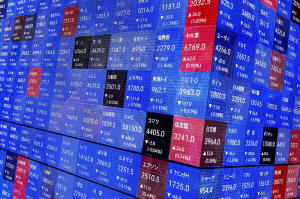Global shares are mixed after Wall Street briefly dips more than 10%
below its record
[March 12, 2025] By
YURI KAGEYAMA
TOKYO (AP) — Global shares were mixed on Wednesday as investors weighed
the impact of President Donald Trump’s tariffs after another day of
losses on Wall Street.
U.S. futures and oil prices were higher.
France's CAC 40 edged up 0.9% in early trading to 8,014.58. Germany's
DAX jumped 1.5% to 22,644.81, while Britain's FTSE 100 added 0.5% to
8,542.24. U.S. shares were set to drift higher with Dow futures up
nearly 0.1% at 41,510.00. S&P 500 futures rose 0.6% to 5,610.00.
Trump's escalation in his trade war is rattling global markets. Trump
has upped his tariffs against Canadian steel and aluminum, prompting the
Canadian province of Ontario to remove a surcharge that had enraged him.
Japan's benchmark Nikkei 225 finished little changed, gaining less than
0.1% to 36,819.09.
Hong Kong’s Hang Seng lost 0.9% to 23,566.42, while the Shanghai
Composite edged down 0.2% to 3,371.92.
Australia's S&P/ASX 200 dropped 1.3% to 7,786.20. South Korea's Kospi
added 1.5% to 2,574.82.
Stocks drooped on uncertainty about how much pain Trump is willing for
the economy to endure in order to get what he wants.
“Trump’s tariff policies continue to have a destabilizing effect on
markets, with investors left guessing as to which measures will either
be added or walked back next,” said Tim Waterer, chief market analyst at
KCM Trade.

[to top of second column] |

An electronic stock board shows Japan's stock prices in Tokyo
Tuesday, March 11, 2025. (Kyodo News via AP)
 Moves by Trump and comments by the
White House on Tuesday didn’t clarify much. White House press
secretary Karoline Leavitt said, “The president will look out for
Wall Street and for Main Street.”
The recent swings followed more warning signals flashing about the
economy as Trump’s on -and- off -again rollout of tariffs creates
confusion and pessimism for U.S. households and businesses.
Such tariffs can hurt the economy directly by raising prices for
U.S. consumers and gumming up global trade. But even if they end up
being milder than feared, all the whipsaw moves could leave U.S.
companies and consumers unwilling to invest or spend.
In energy trading, benchmark U.S. crude added 34 cents to $66.59 a
barrel. Brent crude, the international standard, rose 31 cents to
$69.87 a barrel.
In currency trading, the U.S. dollar rose to 148.50 Japanese yen
from 147.78 yen. The euro cost $1.0921, inching up from $1.0919.
___
AP Business Writer Stan Choe contributed to this report.
All contents © copyright 2025 Associated Press. All rights reserved |